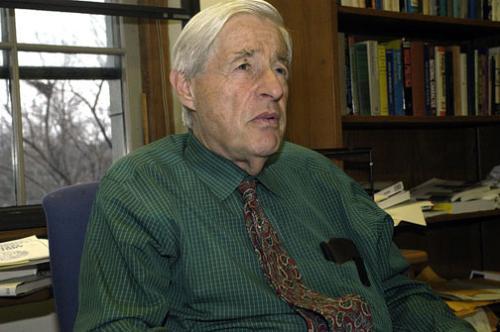
Pen and Paper Revolutionaries: The Academic's Academic
Carl Pforzheimer Professor of Government Sidney Verba may be a giant in his field, but he keeps that private. “I never achieved real fame,” he says, “until [the now defunct] M Magazine did a full-page spread on tweedy professors.”
For someone who likes to think of himself as an “academic’s academic,” that’s just fine. Verba relishes his image as the erudite professor type, and is skeptical that his life’s work will ever seep beyond the ivory tower. “I’d like to think it would, but I’m not convinced that it has political payoff.”
Casey Klofstad, a fifth-year graduate student working on his dissertation under Verba, thinks the professor sells himself short. “Laying out his theory is a very germane tool in real life,” he says.
Verba’s work centers around one of the fundamental paradoxes of democratic life: why, he asks, is a system preoccupied with questions of fairness and equality governed by social elites? Verba explains that he is “interested in studies of ordinary people.” His latest book, still in progress, is a further discussion of social factors behind political inequality.
Searching for the roots of political inequalities is a life’s mission Verba began in 1963 with The Civic Culture, a book he co-authored with the late Gabriel Almond, a professor emeritus at Stanford when he died two years ago. But it’s not his field of interest that has made Verba a pioneer. To research The Civic Culture, Verba, Almond and their team performed a cross-national survey, a method which would become fundamental to political science. For his second major work, Voice and Equality, Verba surveyed 15,000 Americans. The approach made waves in the field of political science, prompting theorists across the country to mimic Verba’s method.
The professor says his current project is just as heady an undertaking as his classics. “My work involves big, large-scale data collection. It takes a long time from beginning to end, and I’m really just getting into it,” he says. That project along with his teaching duties and position at the head of the University Library system keeps Verba busy. But although he plans to retire from teaching next fall, Verba will keep writing.
“I don’t know how he does all he does,” says Roderick MacFarquhar, Chairman of the Government Department and the Leroy B. Williams Professor of History and Political Science.
Klofstad echoes MacFarquhar’s awe. “He is extremely busy, yet he still has time to publish even toward the end of his career,” he says. “It’s a testament to how vigorous he is, and his thirst for knowledge.”
Despite all of his work on political participation, Verba steers clear of advocacy. And he says he does not consider himself a “sound-byte guy.” He shies from any stance on the current administration, except to say that under it inequality is “exacerbated.” He adds, however, that this is “part of a general pattern in American politics.”


